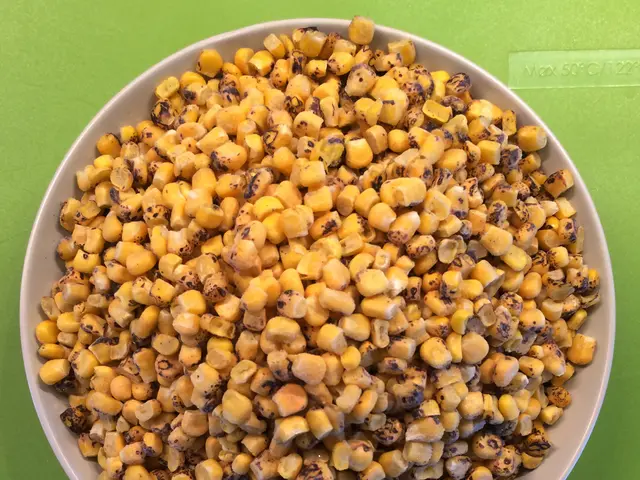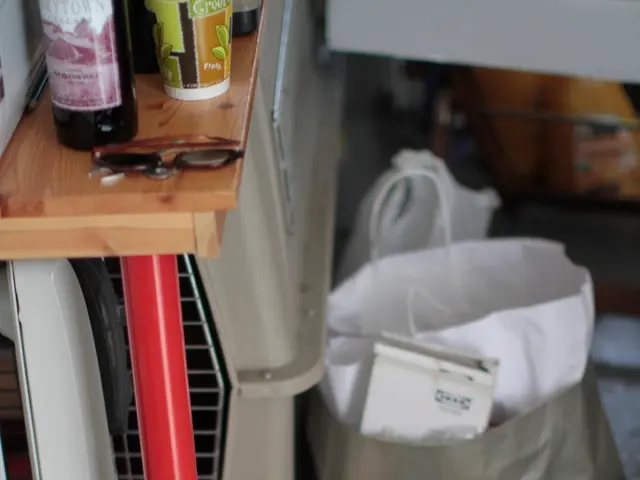A Science-Backed Guide to Savory, Shell-Free Cooked Eggs
Removing Shell from Hard-Boiled Eggs
Who doesn't love a good boiled egg at breakfast? But why does our attempt at peeling it sometimes turn into a wrestling match with a stubborn shell? Never fear, science has a few tricks up its sleeve to make your next breakfast egg-tra special.
Egg's Anatomy: A Quick Overview
Eggs are made up of a hard porous shell, two membranes, egg white (albumen), yolk, and the miracle of life waiting to hatch (though we're not cooking for that today). Interestingly, there's an air chamber between the shell and the innermost membrane in the broader end of the egg.
Researchers have been working on cracking the code for easy egg peeling since the 60s, and it turns out that egg pH plays a crucial role. The ideal pH for easy peeling ranges from 8.7 to 8.9 - yep, that's as alkaline as a home-baked soda bread! The older the egg, the higher the pH, making it easier to peel off the shell.
Water Test: Check Your Egg's Freshness
Wait, how can we find out if an egg is fresh or not? Thankfully, there's an easy way to tell. Pop that egg into a bowl of cold water and watch closely:
- Fresh eggs sink to the bottom, perfect for your morning meal.
- Older eggs rise slowly, and the larger air pocket inside means it may be a touch harder to peel.
- A week-old egg will float horizontally. Go ahead and use it if it still passes a sniff test.
- If the egg floats on its side or top, it's probably past its prime. A word to the wise: don't eat it.
Now you know how to quickly check your eggs' freshness before you even crack the shell.
Spruce up Your Cooking Process
Nutrition scientist Paulomi Burey from the University of Southern Queensland has some tips to share on getting the perfect peel. The key lies in the cooking process.
Water Temperature and Quick Cooling
Move those eggs to boiling water first and then reduce the temperature to a simmer. Make sure your eggs are at room temp before boiling to prevent them from cracking. This little secret should make egg proteins separate from the membrane more easily. Dunk your eggs in ice water right after boiling to help shrink the egg white, making peeling a breeze.
Add Salt and Acids
Increase the salt content of your cooking water to loosen the bond between the egg protein and shell, making it adhere less firmly. If you want to take it a step further, try adding vinegar and baking soda for extra oomph; just be aware that the benefits may vary depending on the pH of the egg and storage periods. Vinegar breaks down the calcium carbonate in the shell, while baking soda weakens the bond between the shell and membrane due to its alkaline properties.
Let's put the science back on the plate and enjoy our delicious, peel-perfect eggs with no morning frustration in sight!
Sources
- Carlsen, J. H. (2006, June 12). The peeling of poultry eggs. Retrieved from https://www.ncbi.nlm.nih.gov/pmc/articles/PMC1481847/
- Dunne, S. T., & McMenamin, D. P. (1999, February). Pressure-cooking the egg. Retrieved from https://www.sciencedirect.com/science/article/pii/S030881469900077X
- El-Zanaty, F. K., & Hewek, M. A. M. (2019, November). Improvement of eggshell structure and cooking behavior by integrating nanoclay into the eggshell material. Retrieved from https://www.sciencedirect.com/science/article/pii/S0309174019305665
- Garcia, T., & Burey, P. (2021, Nov 9). Apart from hard-boiled eggs - delving into what makes them easier to peel and it's not just age. The Conversation. Retrieved from https://theconversation.com/apart-from-hard-boiled-eggs-delving-into-what-makes-them-easier-to-peel-and-its-not-just-age-176823
- Negherbon, S., Rezaei, N. J., Eshmami, T., Moridi, M., Bahrami, A., & Jannaji, A. (2020, October). Generating high-quality blue and white grade eggs using a multiple-layer manure farming system in Iran. Retrieved from https://www.sciencedirect.com/science/article/abs/pii/S0301479720310668
- To ensure the success of your employment in the community, it's crucial to familiarize yourself with the community policy and employment policy.
- In the 1960s, scientists began investigating strategies to make boiled eggs easier to peel, discovering that egg pH plays a significant role.
- For a health-and-wellness lifestyle focused on food-and-drink, incorporating peelable, shell-free cooked eggs can be a part of your morning cooking routine.
- One viable employment policy for a company could involve incorporating health-and-wellness initiatives, such as providing employees with recipes for peelable, boiled eggs.
- During the cooking process, strategies to improve peelability include using water with high alkalinity, quick cooling, and the addition of salt, vinegar, or baking soda, as suggested by nutrition scientist Paulomi Burey.








